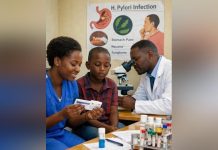Africa-Press – Rwanda. A study by researchers from the University of Toronto suggests that low-carbohydrate diets may contribute to a rise in colorectal cancer risk, particularly when combined with certain gut bacteria.
Colorectal cancer, also known as bowel, colon, or rectal cancer, affects the colon and rectum. Common symptoms include blood in the stool, diarrhea, and constipation.
According to the US Centers for Disease Control and Prevention (CDC), the five-year survival rate for colorectal cancer is 64.4 per cent.
The study, published on March 3 in Nature Microbiology, examined the relationship between diet, gut bacteria, and colorectal cancer development. The researchers investigated how different diets influence bacterial strains and their potential role in cancer formation.
Specifically, they tested three diet types—low-carb, normal, and refined and processed carbohydrates—on mice, along with three bacterial strains; Bacteroides fragilis, Helicobacter hepaticus, and Escherichia coli (E. coli).
The findings revealed that mice on a low-carb, low-fiber diet combined with E. coli developed a higher number of polyps and tumors, which increased the risk of colorectal cancer. The low-carb diet weakened the protective mucus layer in the colon, allowing E. coli to reach colon cells.
The bacteria produced colibactin, a genotoxin that damages DNA, leading to cell senescence and inflammation, both of which contribute to cancer development.
The study showed that while other bacteria and diet combinations did not impact polyp formation, the presence of E. coli in low-carb diet conditions caused disruptions in the gut microbiome.
These disruptions created an environment favorable for colorectal cancer growth. The researchers pointed out that E. coli is present in approximately 60 per cent of colorectal cancer cases.
Although these results are concerning, the study also provided a way to alleviate the risks. Researchers found that adding fiber to the mice’s diet reduced tumor formation and helped control inflammation.
Colorectal cancer accounts for approximately 10 per cent of all cancer cases. It is also the second leading cause of cancer-related deaths globally. While it predominantly affects individuals aged 50 and above, its increasing prevalence in younger populations has raised alarm, according to the World Health Organisation (WHO).
Given the study’s findings, researchers are now looking to explore whether certain types of fiber offer greater protective benefits. They also aim to investigate the effects of these dietary interactions in human subjects to understand their implications better.
Need for early detection of colorectal cancer and screening in Rwanda
Colorectal cancer is increasingly becoming a public health concern in Rwanda, with 334 cases reported in 2023, according to Dr. Theoneste Maniragaba, the Director of the Cancer Programme at Rwanda Biomedical Centre (RBC).
Females accounted for a slightly higher proportion of these cases (188) compared to males (146), and the disease affects younger individuals between 40 and 50 years, a contrast to the Western trend where it predominantly affects those above 50.
Dr. Maniragaba highlighted that colorectal cancer has no single cause but arises from a combination of factors. These include genetic predisposition, certain viral infections, and dietary habits.
“While there is no specific common cause for colon cancer, understanding the risks is essential in prevention. Educating people about these risks, along with the signs and symptoms, plays a crucial role in enabling early detection,” he noted.
Dr. Maniragaba said that the common symptoms of colorectal cancer include persistent constipation, discomfort during bowel movements, and bloody stool.
Bloody stool, often indicative of advanced tumor growth, is one of the warning signs that necessitates immediate medical attention. Dr. Maniragaba emphasized the need for early consultation, stating that early-stage detection increases the chances of treatment.
“Screening methods for colorectal cancer include the fecal occult blood test, which detects hidden blood in stool, and colonoscopy, a more broad diagnostic procedure. In a colonoscopy, a specialized scope is used to examine the rectum and colon for any signs of malignancy. When detected early, colorectal cancer is treatable.”
However, the oncologist added that late-stage detection, when the cancer has spread to other organs such as the liver, lungs, or brain, leaves patients with limited options, focusing on palliative care rather than a cure.
Despite the rising incidence of colorectal cancer, Rwanda lacks a national screening programme. Dr. Maniragaba noted that the country needs a collaborative effort with endoscopy specialists—gastroenterologists skilled in diagnosing and treating digestive system disorders.
Developing national guidelines for colorectal cancer screening, similar to those established for cervical and breast cancer, will address this gap, he added.
Colorectal cancer is currently the sixth most common cancer in Rwanda, following breast, cervical, prostate, stomach, and liver cancers. However, the increasing prevalence among younger age groups signals a need for awareness and action.
Diet and lifestyle choices to reduce colorectal cancer risk
“Fiber is crucial for gut health as it supports the formation of good gut bacteria essential for digestion and overall well-being,” said Martine Umuhire, a nutritionist and dietician at Nutri-Sante Rwanda, a nutrition cabinet center in Kicukiro.
She advises people to incorporate fiber-rich foods like fruits, vegetables, whole grains, and legumes into daily diets as they provide fiber, antioxidants and phytochemicals that help protect against cancer. She added that a variety of colorful options is best.
Umuhire said legumes like beans, lentils, and peas are great sources of fiber, while nuts and seeds such as almonds, walnuts, chia seeds, and flaxseeds provide healthy fats and additional fiber.
She noted that low-fat dairy products, including yogurt and milk, are good sources of calcium and vitamin D, which can lower the risk of colorectal cancer.
When it comes to proteins, Umuhire recommended lean options like fish, skinless poultry, and tofu.
“Rich in omega-3 fatty acids, these proteins can slow the growth of cancer cells,” she explained.
However, she cautioned against red and processed meats, sugary drinks, and excessive alcohol, saying they might lead to chronic inflammation and increased cancer risks.
Umuhire recommends maintaining a healthy weight, staying physically active, and avoiding smoking, as obesity, a sedentary lifestyle, and smoking raise the risk of colorectal cancer.
For More News And Analysis About Rwanda Follow Africa-Press






